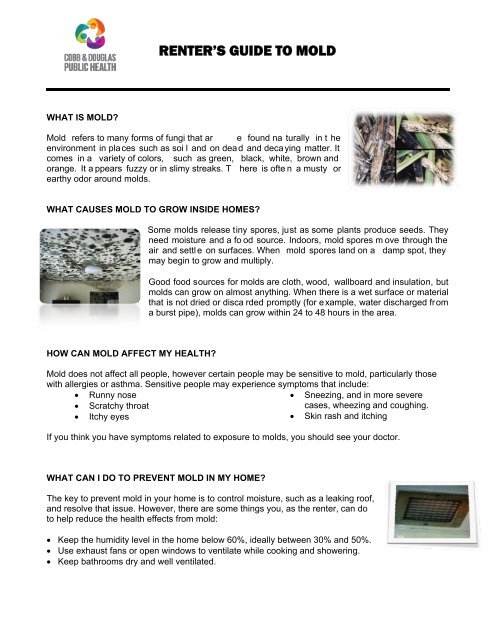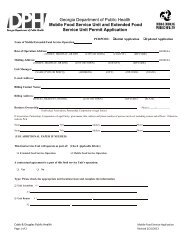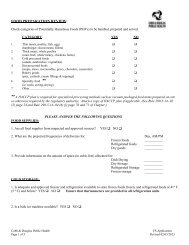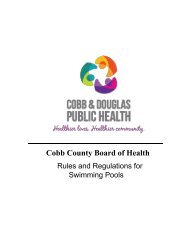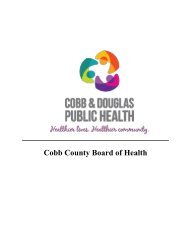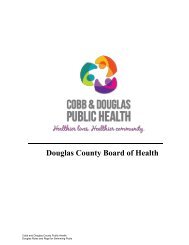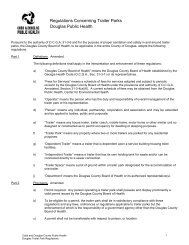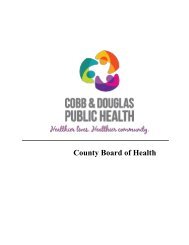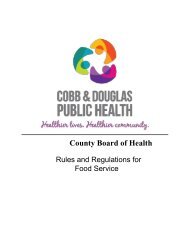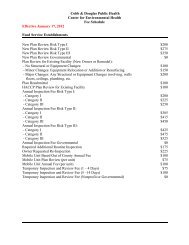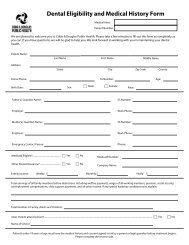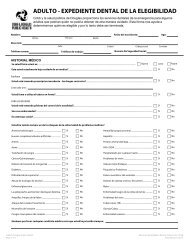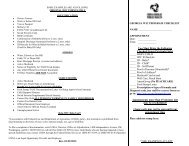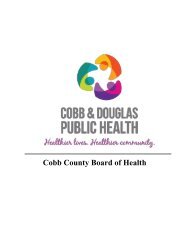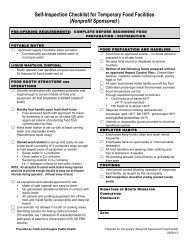RENTER'S GUIDE TO MOLD - Cobb & Douglas Public Health
RENTER'S GUIDE TO MOLD - Cobb & Douglas Public Health
RENTER'S GUIDE TO MOLD - Cobb & Douglas Public Health
You also want an ePaper? Increase the reach of your titles
YUMPU automatically turns print PDFs into web optimized ePapers that Google loves.
RENTER’S <strong>GUIDE</strong> <strong>TO</strong> <strong>MOLD</strong><br />
WHAT IS <strong>MOLD</strong>?<br />
Mold refers to many forms of fungi that ar e found na turally in t he<br />
environment in pla ces such as soi l and on dea d and deca ying matter. It<br />
comes in a variety of colors, such as green, black, white, brown and<br />
orange. It a ppears fuzzy or in slimy streaks. T here is ofte n a musty or<br />
earthy odor around molds.<br />
WHAT CAUSES <strong>MOLD</strong> <strong>TO</strong> GROW INSIDE HOMES?<br />
Some molds release tiny spores, just as some plants produce seeds. They<br />
need moisture and a fo od source. Indoors, mold spores m ove through the<br />
air and settl e on surfaces. When mold spores land on a damp spot, they<br />
may begin to grow and multiply.<br />
Good food sources for molds are cloth, wood, wallboard and insulation, but<br />
molds can grow on almost anything. When there is a wet surface or material<br />
that is not dried or disca rded promptly (for e xample, water discharged from<br />
a burst pipe), molds can grow within 24 to 48 hours in the area.<br />
HOW CAN <strong>MOLD</strong> AFFECT MY HEALTH?<br />
Mold does not affect all people, however certain people may be sensitive to mold, particularly those<br />
with allergies or asthma. Sensitive people may experience symptoms that include:<br />
Runny nose<br />
Sneezing, and in more severe<br />
Scratchy throat<br />
cases, wheezing and coughing.<br />
Itchy eyes<br />
Skin rash and itching<br />
If you think you have symptoms related to exposure to molds, you should see your doctor.<br />
WHAT CAN I DO <strong>TO</strong> PREVENT <strong>MOLD</strong> IN MY HOME?<br />
The key to prevent mold in your home is to control moisture, such as a leaking roof,<br />
and resolve that issue. However, there are some things you, as the renter, can do<br />
to help reduce the health effects from mold:<br />
Keep the humidity level in the home below 60%, ideally between 30% and 50%.<br />
Use exhaust fans or open windows to ventilate while cooking and showering.<br />
Keep bathrooms dry and well ventilated.
RENTER’S <strong>GUIDE</strong> <strong>TO</strong> <strong>MOLD</strong><br />
Clean, dry or remove anything from your home that is water damaged within 24 to 48 hours.<br />
WHAT ARE THE BASIC <strong>MOLD</strong> CLEAN-UP STEPS?<br />
1. Fix plumbing leaks and other water problems as soon as possible.<br />
2. Scrub mold off hard surfaces with detergent and water.<br />
3. Dry all materials completely.<br />
4. When cleaning, consider the following:<br />
<br />
<br />
<br />
Avoid breathing mold spores, getting it in your eyes, or on your skin.<br />
Routine use of chlorine bleach is not necessary or recommended. Some situations may<br />
require it, however, so use good judgment to decide if you need it.<br />
Consult a specialist if you are unsure about how to clean an item, if it is expensive, or if<br />
it has sentimental value. Specialists in repair and restoration of water damaged<br />
household items are commonly listed in phone directories. Look for specialists who are<br />
affiliated with professional organizations and be sure to check references.<br />
5. Note: Dead mold may still cause allergic reactions in some people, and therefore may also<br />
need to be removed.<br />
6. Absorbent materials may have to be thrown away if they become moldy. Mold can grow in the<br />
empty spaces of porous materials, so it may not be removed completely.<br />
More information abo ut clean-up and preve ntion is available from the U.S. Environmental<br />
Protection Agency at www.epa.gov/mold and your county University of Georgia Cooperative<br />
Extension agent at (800) ASK-UGA1, and at www.fcs.uga.edu/ext/housing/mold.php.<br />
AS A RENTER, WHERE CAN I GET MORE INFORMATION?<br />
More information for renters about mold, moisture problems, and the Georgia Landlord Tenant<br />
Handbook can be found at www.dca.ga.gov/housing/HousingDevelopment/programs/downloads/<br />
Georgia_Landlord_Tenant_Handbook.pdf. This handbook is designed to address common residential<br />
landlord-tenant issues and defines the role of the landlord and tenant during these issues. Additional<br />
information is available from the Georgia Apartments Association at www.ga-apt.org.<br />
The Landlord-Tenant Hotline is no longer available to renters, however the hotline recommends<br />
using www.lawhelp.org for additional information about renting in Georgia. Some areas may also be<br />
able to provide assistance through local housing code enforcement. Contact city or county officials to<br />
find out if there are housing codes applicable in your area.


